




When it comes to doing the dishes, many people wonder if it’s safe or effective to use laundry detergent instead of dish soap. After all, they both clean things, so why not save some money and use what you already have on hand? While there are some similarities between laundry detergent and dish soap, they are not the same, and using the wrong one for the task at hand can lead to less effective cleaning or even damage to your dishes.
Laundry detergent is specifically formulated for use on clothing and other fabrics. It contains enzymes and surfactants that are designed to break down stains and remove dirt and grime from clothes. These ingredients may be too harsh or abrasive for use on delicate dishes and cookware, and can leave a residue that is difficult to rinse off.
Dish soap, on the other hand, is specifically formulated for use on dishes, glasses, and utensils. It is typically milder and less abrasive than laundry detergent, making it safe to use on a wider variety of materials. Dish soap also has different surfactants that are specifically designed to cut through grease and grime, leaving dishes clean and shiny.
Using laundry detergent to wash dishes can lead to a variety of issues. It may not effectively cut through grease and grime, leaving your dishes still dirty and greasy. The residues left behind by laundry detergent can also cause a soapy taste or odor on your dishes, making them less enjoyable to use. In addition, the harsher ingredients in laundry detergent can damage delicate dishes, causing them to become scratched or worn down over time.
Exploring Laundry Detergent for Dishwashing
When it comes to cleaning dishes, we typically think of using dish soap or dishwasher detergent. However, in a pinch or when faced with limited options, you may wonder if laundry detergent can be used as a substitute. Let’s explore this topic further.
Can laundry detergent be used to wash dishes?
Technically, laundry detergent can be used to wash dishes. Both laundry detergent and dish soap contain surfactants, which are chemicals that help to break down grease and grime. However, there are some important factors to consider before using laundry detergent for dishwashing.
1. Ingredients and Safety

Laundry detergents may contain ingredients that are not intended for use on dishes. They may contain higher levels of certain chemicals that could be harmful if ingested or if left residue on dishes. Therefore, it is essential to check the label of the laundry detergent to ensure that it is safe for dishes.
2. Scent and Taste
Laundry detergents often have strong scents that are designed to leave clothes smelling fresh. These scents can transfer to the dishes and potentially affect the taste of your food. If using laundry detergent for dishwashing, opt for unscented or mild-scented varieties to avoid any unpleasant taste on your dishes.
3. Efficiency and Effectiveness
While laundry detergent can effectively clean dishes, it may not be as efficient or as effective as dish soap or dishwasher detergent. Dish soaps are specifically formulated to cut through grease and remove stuck-on food, making them better suited for dishwashing tasks.
4. Residue and Rinse
Laundry detergents may leave behind a residue on your dishes, especially if they are not rinsed thoroughly. This residue can be difficult to remove and may lead to an unpleasant film or taste on your dishes. Proper rinsing is crucial when using laundry detergent for dishwashing.
When to Use Laundry Detergent for Dishwashing
While it is generally recommended to use dish soap or dishwasher detergent for dishwashing, there may be situations where using laundry detergent is a viable option. Here are some scenarios when using laundry detergent for dishwashing can be considered:
- In an emergency situation where no dish soap is available.
- When camping or in a remote location where access to dish soap is limited.
- For washing non-food contact items such as cleaning brushes or sponges.
Conclusion
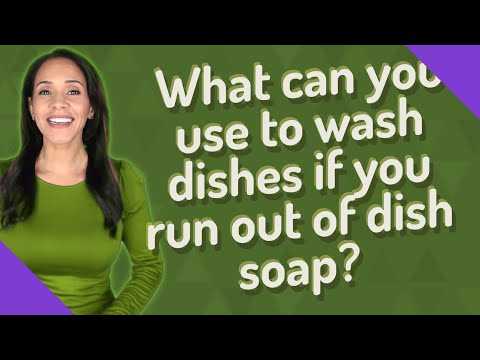
While laundry detergent can technically be used for dishwashing, it is not the ideal choice. There are potential safety, taste, efficiency, and residue concerns to consider. It is best to use dish soap or dishwasher detergent whenever possible. If using laundry detergent, always check the label for safety and rinse thoroughly to minimize residue.
The Difference between Laundry Detergent and Dishwashing Soap
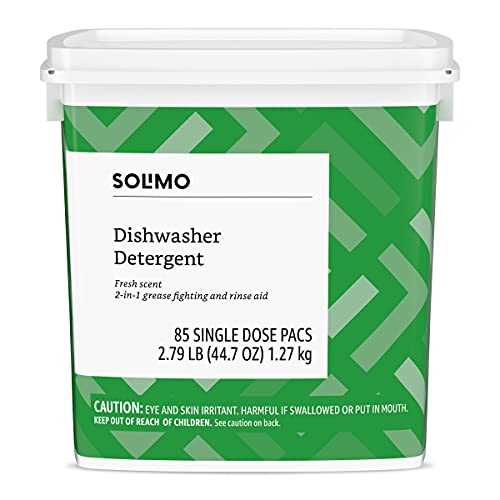
Many people wonder if they can use laundry detergent to wash dishes if they run out of dishwashing soap. While laundry detergent and dishwashing soap may have similar functions, there are significant differences between the two.
Ingredients
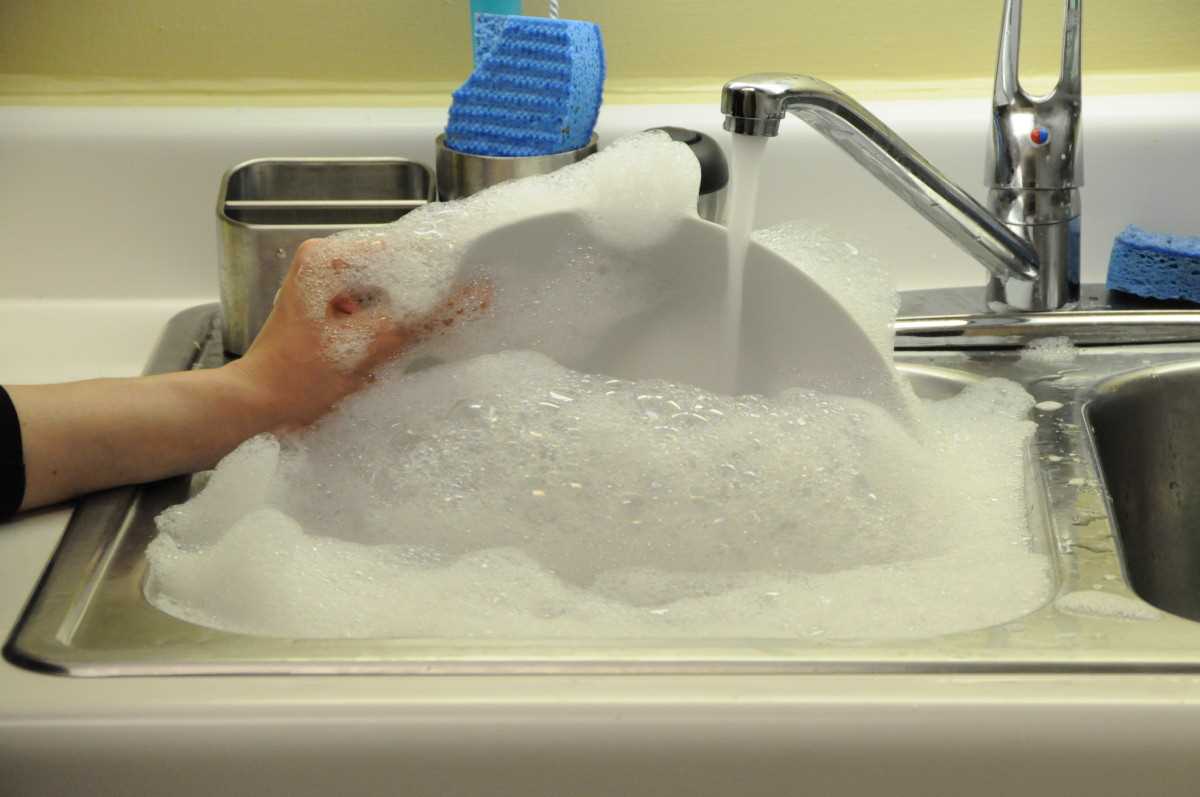
Laundry detergents are specifically designed for use in washing machines to remove tough stains and dirt from clothes. They contain enzymes, chemicals, and surfactants that are formulated to break down and remove various types of stains. On the other hand, dishwashing soaps are designed for handwashing dishes and are formulated to cut through grease and food residues. Dishwashing soap typically contains grease-cutting agents like sodium lauryl sulfate (SLS) or sodium laureth sulfate (SLES).
Effectiveness
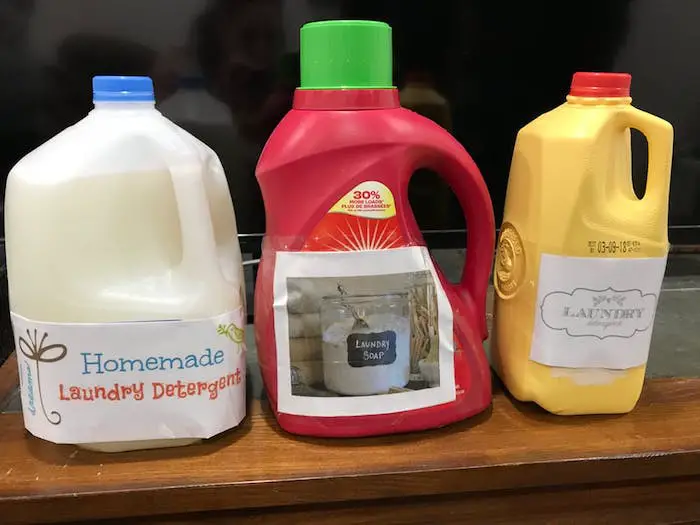
While laundry detergents may be effective in removing stains from clothes, they may not be as effective in cutting through grease and removing food residues from dishes. Dishwashing soap, on the other hand, is specifically formulated to tackle greasy dishes, making it more effective in the kitchen.
Foaming
Laundry detergents tend to produce more foam than dishwashing soaps. This is because the foaming action helps to agitate and clean clothes in a washing machine. Dishwashing soaps, on the other hand, produce less foam since excessive foaming can make it difficult to rinse dishes properly.
pH Levels
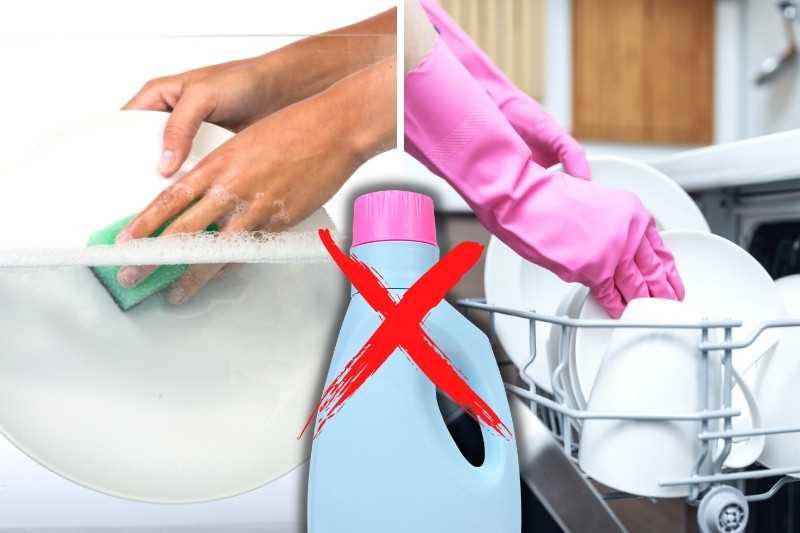
Laundry detergents generally have a higher pH level, making them more alkaline. This is to help break down tough stains and dirt. Dishwashing soaps, on the other hand, have a lower pH level to help neutralize the acidity of food residues and effectively clean all types of dishes.
Safety
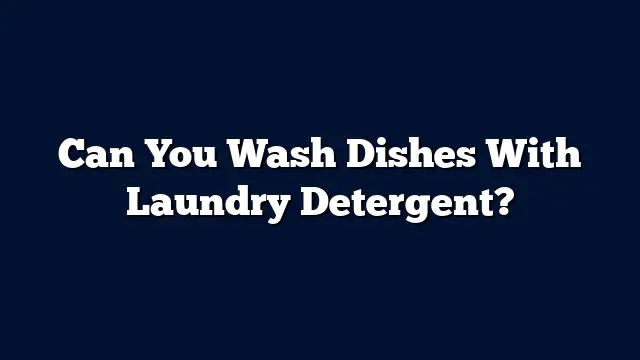
While laundry detergents are generally safe for use on clothes, they should not be used on dishes as they may leave behind residues that can be harmful if ingested. Dishwashing soaps are formulated to be safe for use on dishes and are not harmful if accidentally ingested.
Conclusion
While it may be tempting to use laundry detergent if you run out of dishwashing soap, it is not recommended. Laundry detergent and dishwashing soap are formulated for different purposes and have different ingredients. It is best to use the appropriate soap for the task at hand to ensure safe and effective cleaning.
Potential Risks of Using Laundry Detergent on Dishes
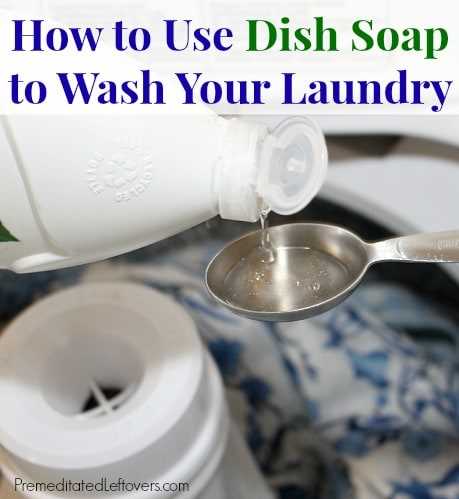
- 1. Toxicity: Laundry detergents are formulated to clean clothes and may contain chemicals that are toxic if ingested. Using laundry detergent on dishes increases the risk of these chemicals coming into contact with food and potentially being ingested.
- 2. Residue: Laundry detergents are designed to rinse out thoroughly during the washing process, but they may leave behind a residue on dishware when used for washing. This residue can affect the taste of the food and may require additional rinsing to remove.
- 3. Harshness: Laundry detergents are often more powerful in terms of cleaning agents and may be too harsh for delicate dishware, such as fine china or glass. They can cause scratching or etching on the surface of these items, leading to damage and reduced lifespan.
- 4. Fragrance: Many laundry detergents have added fragrances to give clothes a fresh scent. These fragrances may transfer to dishes and affect the taste or smell of the food. Some people may also have allergies or sensitivities to these fragrances.
It is important to note that there are specific dishwashing detergents available that are formulated to be safe for use on dishes. These dishwashing detergents are designed to remove grease, grime, and food residue without posing potential risks to health or dishware. It is recommended to use these products instead of laundry detergents when washing dishes to ensure optimal safety and cleanliness.
Alternative Uses for Laundry Detergent
- Cleaning Household Surfaces: Laundry detergent can be used to clean a variety of household surfaces, including countertops, tile, and floors. Simply dilute a small amount of detergent in water and use a cloth or sponge to scrub the surface. Rinse well to remove any residue.
- Removing Stains: Laundry detergent can be used as a pre-treatment for stubborn stains on clothing or other fabrics. Apply a small amount of detergent directly to the stain, rub it in gently, and then wash as usual.
- Cleaning Appliances: Use laundry detergent to clean appliances like stovetops, ovens, and microwaves. Mix a small amount of detergent with warm water and use a sponge or cloth to scrub away grease and grime.
- Removing Grease: Laundry detergent can be an effective degreaser. Use it to remove grease stains from clothing, dishes, or surfaces by applying a small amount directly to the stain and washing or rinsing thoroughly.
- Washing Delicates: Gentle laundry detergents can be used to wash delicate items, such as lingerie or silk. Follow the garment’s care instructions and use a small amount of detergent in cold water.
- Cleaning Jewelry: Mix a small amount of mild laundry detergent with warm water and use a soft brush to gently clean jewelry pieces. Rinse well and dry thoroughly.
- Removing Soap Scum: Laundry detergent can help remove soap scum from bathroom surfaces, such as shower doors and tiles. Mix a small amount with water and scrub the scum away using a sponge or brush.
- Washing Vehicles: Add a small amount of laundry detergent to a bucket of warm water and use it to wash your car or other vehicles. Rinse well to avoid any residue.
Safe and Effective Dishwashing Solutions
1. Dish Soap
Using dish soap specifically formulated for washing dishes is the safest and most effective solution for cleaning your dirty dishes. Dish soap is designed to cut through grease and food residues, making it ideal for removing tough stains and grime from dishes. It is also gentle on your hands and safe for use on various materials such as glass, porcelain, metal, and plastic.
2. Natural Cleaning Solutions
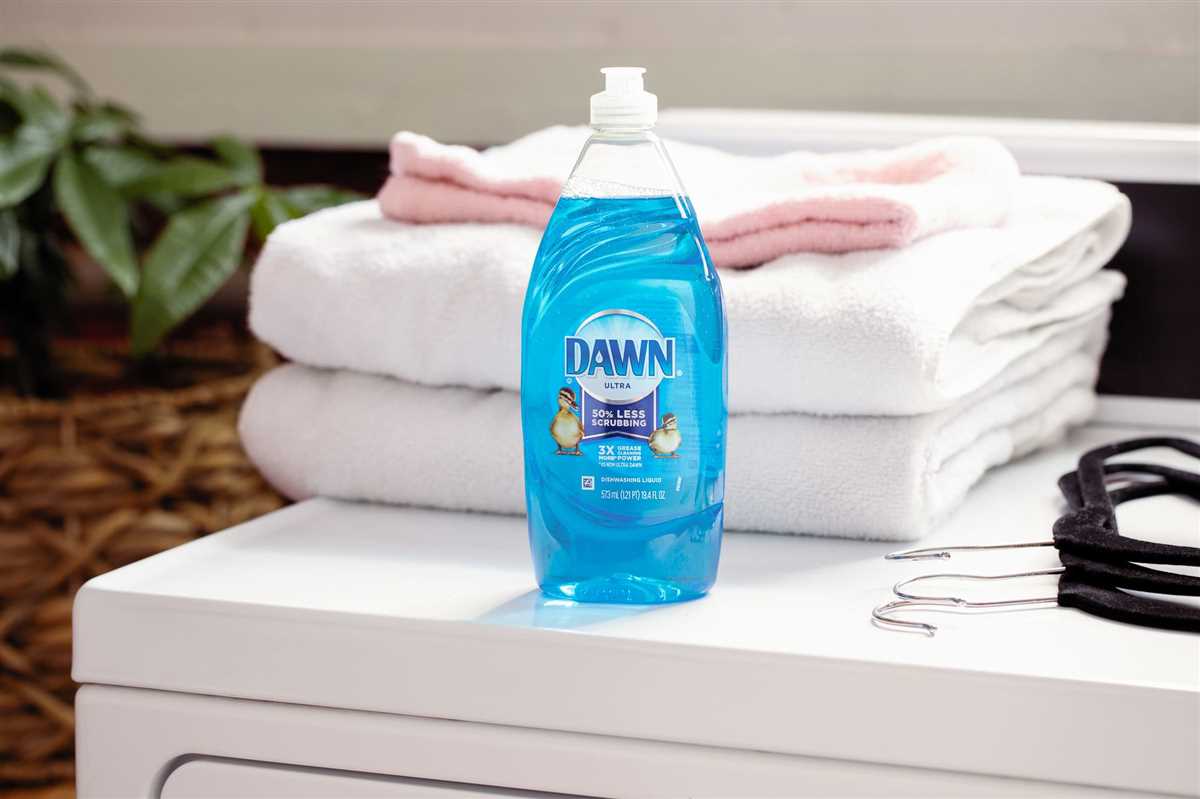
If you prefer to use natural ingredients, there are several options available that can effectively clean your dishes. Lemon juice, vinegar, and baking soda can be mixed with warm water to create a natural cleaning solution. These ingredients have natural antibacterial properties and can help remove odours and stubborn stains. However, it’s important to note that natural cleaning solutions may not be as effective on heavy grease and baked-on food residues.
3. UV Sterilization
UV sterilization is an innovative and eco-friendly method of washing dishes. It uses ultraviolet light to kill bacteria and viruses, ensuring your dishes are thoroughly cleaned and free from harmful pathogens. This method is particularly useful for sanitizing baby bottles and other items that require high levels of hygiene. UV sterilization can be done using specialized appliances or by exposing the dishes to natural sunlight for extended periods.
4. Dishwasher
Using a dishwasher is a convenient and efficient way to wash dishes. Dishwashers use high temperatures and powerful jets of water to remove dirt and bacteria from your dishes. They also eliminate the need for manual scrubbing and save water compared to hand washing. However, it’s important to read your dishwasher’s manual and choose the appropriate detergent for optimal cleaning results.
5. Hand Sanitizer
In certain situations, such as camping or travel, hand sanitizer can be used as a temporary solution for washing dishes. Hand sanitizers contain alcohol, which has antibacterial properties and can help remove germs and dirt from your dishes. However, hand sanitizer alone may not be as effective as dish soap or other cleaning solutions, so it’s best to use it as a last resort when no other options are available.
6. Tips for Effective Dishwashing
Regardless of the cleaning solution you choose, here are some tips to ensure effective dishwashing:
- Scrape off excess food residues before washing
- Use hot water for better cleaning results
- Soak heavily soiled dishes in warm, soapy water before washing
- Use a scrub brush or sponge to remove stubborn stains
- Allow dishes to air dry or use a clean towel to dry them thoroughly
- Regularly clean and maintain your dishwasher for optimal performance
By following these tips and using a safe and effective dishwashing solution, you can ensure that your dishes are clean, hygienic, and safe to use for your next meal.
FAQ
Can I use laundry detergent to wash dishes?
It is not recommended to use laundry detergent to wash dishes. Laundry detergents are designed to remove tough stains from clothes and may contain chemicals that can be harmful if ingested. It is best to use a dishwashing detergent specifically made for dishes.
What are the risks of using laundry detergent to wash dishes?
Using laundry detergent to wash dishes can be risky because laundry detergents are formulated differently from dishwashing detergents. Laundry detergents may contain harsh chemicals that can leave a residue on dishes and potentially be harmful if ingested. It is safer to use a dishwashing detergent that is specifically made for cleaning dishes.
What can I use instead of dishwashing detergent?
If you don’t have dishwashing detergent on hand, there are a few alternatives you can use. One option is to use a mixture of baking soda and water, which can help remove grease and food particles from dishes. Another option is to use white vinegar, which can help break down grease and remove odors. However, it is still recommended to use dishwashing detergent for the best results.
Is it safe to use laundry detergent to wash dishes in an emergency?
In an emergency situation where you don’t have access to dishwashing detergent, you can use a small amount of laundry detergent to wash dishes. However, it is important to rinse the dishes thoroughly to remove any residue and make them safe for use. It is still recommended to use dishwashing detergent if possible, as it is specifically formulated for cleaning dishes.













